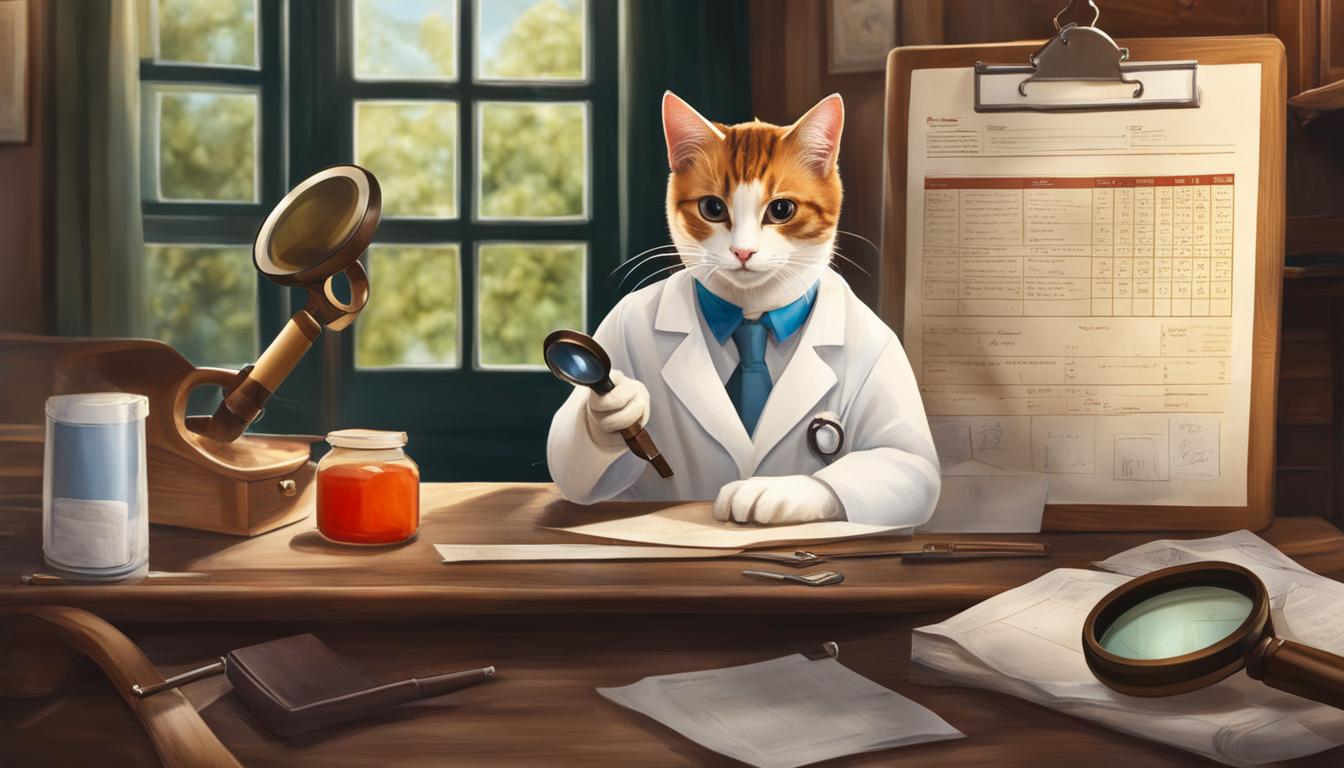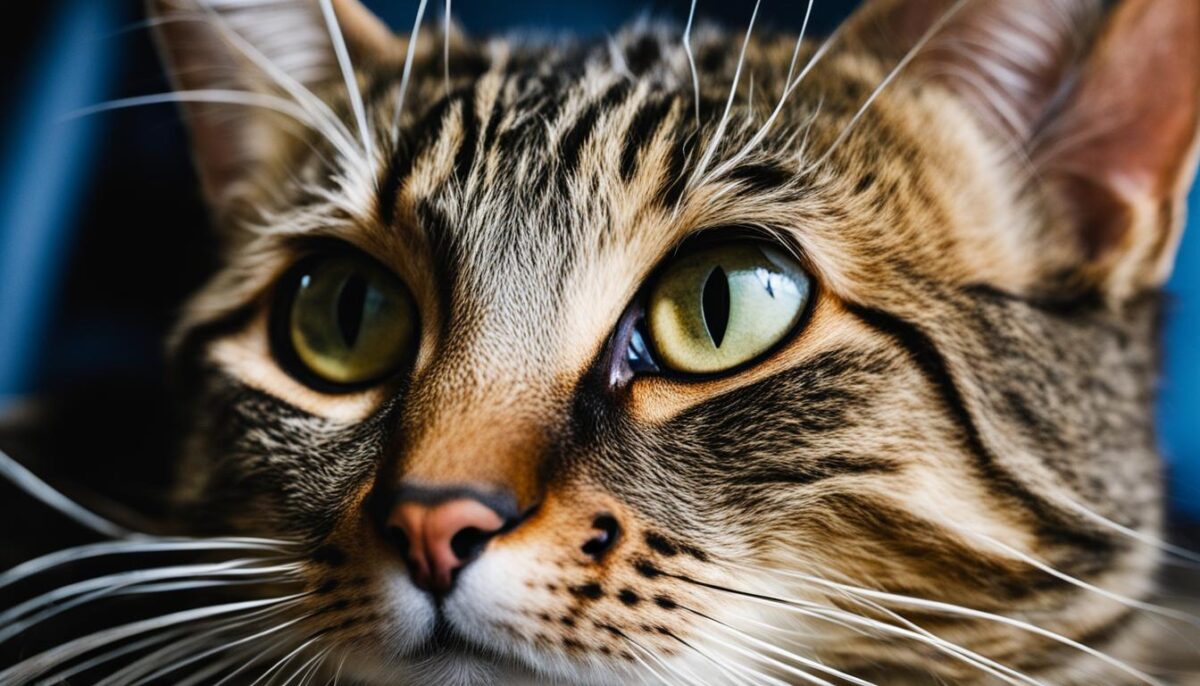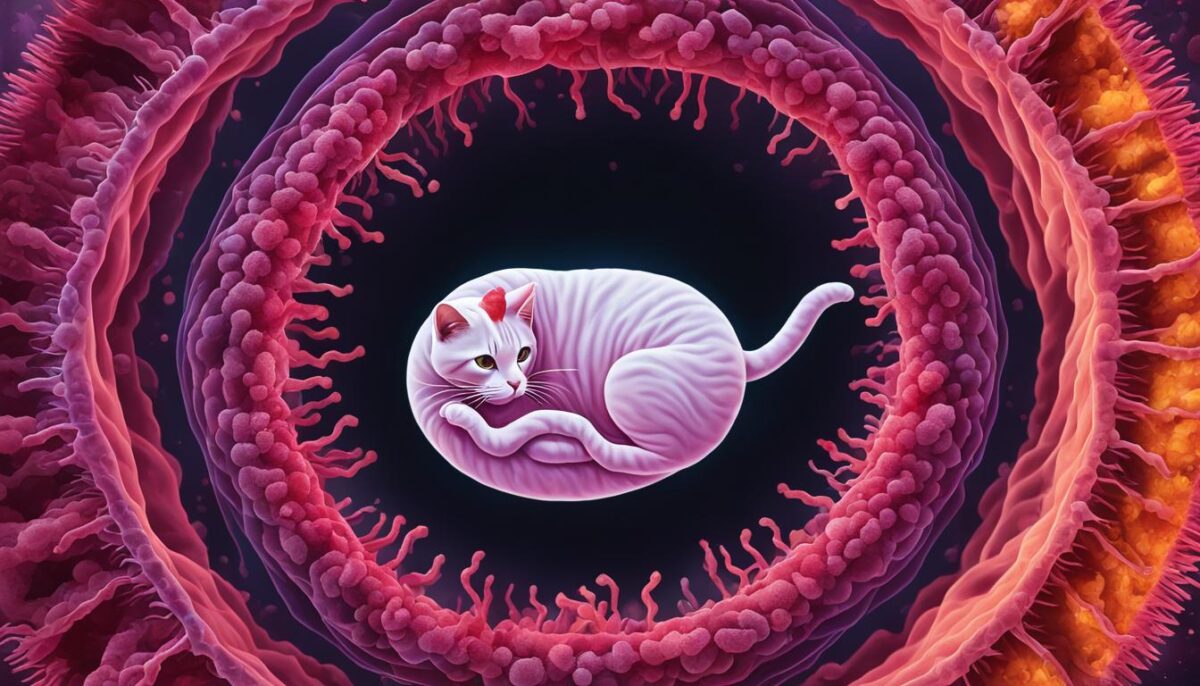Hey there! Have you ever seen a cat with a funny face or acting in a silly way, and someone said, “Maybe it has Down syndrome” like people can have? Well, let’s chat about cat health and what’s really going on with our furry friends. Cats are different from us, especially when it comes to their genes – that’s the feline genetics part that makes every kitty unique. Unlike humans, cats just can’t have Down syndrome. The term “Down syndrome cat” is not a real thing in the world of animal doctors. Let’s learn the facts, so we understand our pets better.
Key Takeaways
- Cats have their own special genes, different from people’s.
- Even if a cat looks or acts unusual, it doesn’t mean it has Down syndrome.
- Cat health is important, and different things can make a cat unique.
- Feline genetics help us learn why each cat is one of a kind.
- “Down syndrome in cats” isn’t a real thing – cats can’t actually have it.
- If a cat doesn’t act or look like other cats, it’s best to talk to a vet.
Understanding Feline Genetics and Chromosomes
Hey there! Have you ever wondered how cats are different from us when it comes to their genes and chromosomes? Well, let’s dive into the world of feline genetics and see what makes our furry friends unique.
Humans vs. Cats: Chromosomal Differences
You see, people have something called chromosomes in their cells, and these come in pairs. We humans have 23 pairs of them. Now, in some humans, there’s an extra one called chromosome 21, and this causes Down syndrome. But here’s the thing – cats only have 19 pairs of chromosomes. That means they can’t have an extra chromosome 21 like people do. It’s just not possible because their genetic blueprint is quite different!
The Reality behind Trisomy in Cats
Now, you might hear a word like trisomy and wonder what that’s about. It’s a fancy term for having an extra chromosome. Although our kitty pals don’t get Down syndrome, they can have their own kind of trisomy. One example is Klinefelter syndrome, where male cats have an extra bit of genetic material. It’s a pretty rare thing, though!
Cat Chromosomes and Genetic Conditions
Cats can have their own special congenital disorders, which are problems they’re born with. These can make them look or act differently, sometimes kind of like humans with Down syndrome, but they’re not the same thing. It could be other stuff causing these issues, like infections or trouble with their nervous system.
Learning about cat chromosomes and how they may lead to certain conditions helps us better care for our four-legged companions. Remember, if you ever notice something off with your kitty, it’s best to chat with a vet. They know all about these things and can help your cat stay happy and healthy!
So, all in all, cats are pretty cool, huh? They’ve got their own special set of genes that make them the adorable creatures we love. Next time you look at your purring pal, just think of all the incredible genetic wonders that make them who they are!
Dispelling the Myth: Can Cats Get Down Syndrome?
Hey, have you heard people say that a cat looks like it has Down syndrome? Well, this is a feline health myth. Cats have different genes than humans. They can’t have Down syndrome because it is something that only people can have. This happens because cats don’t have the same number of chromosomes as humans do. Instead, cats have their own kinds of health facts and issues.
Sometimes, our furry friends might look or act a bit different. This does not mean they have feline Down syndrome. Cats with odd faces or who do funny stuff might be dealing with other things. They might be sick, or their bodies grew in different ways from other cats.
It’s super important to take any cat that seems not right to a vet. Your vet is like a doctor for animals. They can check out your cat to find out why it is not acting or looking like other cats. They know lots of cat health facts. When cats don’t feel well, it’s not because they have Down syndrome. It’s our job to make sure they get the help they need.
| Human Health | Cat Health |
|---|---|
| Humans have 23 pairs of chromosomes | Cats have 19 pairs of chromosomes |
| Down syndrome happens with an extra chromosome 21 | Cats can’t have an extra chromosome 21 |
| Humans can have Down syndrome | Cats can have other conditions and should see a vet |
Recognizing Symptoms Wrongly Attributed to ‘Feline Down Syndrome’
When you see a cat with a funny-looking face or acting a bit unusual, you might think they have something like Down syndrome in people. But that’s not true for kitties. Cats have their own special traits and sometimes what might look odd is just them being them! Let’s learn about some signs that might confuse us.
Physical Traits That Cause Confusion
Cats can have feline physical traits like noses that seem too big or eyes really far apart. Some kitties have ears that aren’t shaped like other cats’ ears, and sometimes they have bodies that feel kind of floppy. But these are just different ways cats can look, not a sign of a problem like Down syndrome.
Behavioral Signs Misinterpreted as Down Syndrome
About cat behavior, sometimes cats might walk in a wobbly way or have a hard time going to the bathroom right. These things can happen for lots of reasons, but not because of Down syndrome. Cats can also have trouble with seeing or hearing well, but again, this doesn’t mean they have the same things as people with Down syndrome. Feline abnormalities are just ways that some cats are different, and that’s okay.
Table: Differences Between Common Physical and Behavioral Traits vs. Health Issues
| Traits | Just a Trait or Possible Health Issue? |
|---|---|
| Broad Nose | Just a Unique Look |
| Unusual Ear Shape | Just a Unique Look |
| Wide-Set Eyes | Just a Unique Look |
| Low Muscle Tone | Possible Health Issue |
| Problems Walking | Possible Health Issue |
| Hard Time with Elimination | Possible Health Issue |
| Sensory Issues | Possible Health Issue |
Remember, each cat is special and even if they look or act differently, it doesn’t mean they have a problem like Down syndrome. Always love and care for your cat, and if you’re worried about their health, the vet can help you figure it out!
The Impact of Viral Infections on Feline Development
Cats, just like people, can get sick from viruses. One of these viruses is called the feline panleukopenia virus. It’s a big word, but it’s important to know about because it can make kittens sick even before they are born. If mommy cats get this virus when they have babies in their belly, the kittens could be born with problems that make it hard for them to walk or play.
Understanding Feline Panleukopenia Virus
This virus, which some people call FPV or cat parvo, is really bad for cats. It attacks their insides and can make them feel very sick. The little guys, the kittens, can get it from their mom and then they might wobble when they try to walk, or shake a bit. It’s not because they’re cold or scared, but because the virus has made it hard for their little brains to help them move smoothly.
Congenital Risks Associated with In-Utero Infections
When a kitten has trouble because of a virus like the feline panleukopenia virus, we say it has a congenital disorder. That means the problem was there when they were born. These kittens are very special and they need people to take extra good care of them. It’s not like they have what people call Down syndrome, but they have their own kind of challenges and need lots of love too.
Caring for Cats with Congenital and Neurological Conditions
If you have a cat with congenital or neurological conditions, it means your furry friend has special needs. These cats might not look or act like other cats. They have unique challenges that can include tough times with walking, seeing, or even hearing. But don’t worry, you can still give them a happy and safe life with the right care. Cats like these are often called special needs cats because they need extra help and love.
Neurological conditions in cats can make their lives tricky. They might walk in a wobbly way or have a hard time jumping up to their favorite spot. That’s why it’s important to keep an eye on them and make sure they don’t get hurt. Creating a safe space where they can play and rest without dangers is really important. Also, it’s a good idea to visit the vet often to check on their health. The vet can help you understand the best ways to care for your cat.
Remember, even though they’re special, they’re not so different. They might seem like they have a hard time with some things, but with your patience and help, they can enjoy life just like any other cat. If you think your cat may have congenital cat disorders or any other health issues, it’s always best to talk to a vet. They can tell you what to do to make sure your cat is as healthy and happy as possible.
FAQ
Can Cats Get Down Syndrome?
No, cats cannot get Down Syndrome as it is a human genetic disorder associated with an extra copy of chromosome 21, which cats do not have. They may show unusual traits or behaviors that are due to other conditions.
What Are the Chromosomal Differences Between Humans and Cats?
Humans have 23 pairs of chromosomes, and people with Down syndrome have an extra (or partial extra) copy of chromosome 21. Cats have only 19 pairs of chromosomes, making the possibility of having a trisomy 21 genetically impossible for them.
What Does Trisomy in Cats Refer To?
While cats cannot have trisomy 21, they can have other rare chromosomal abnormalities, such as Klinefelter syndrome, which involves extra genetic material but presents differently than Down syndrome.
Can Genetic Conditions in Cats Be Mistaken for Down Syndrome?
Yes, certain genetic conditions in cats may lead to physical and behavioral anomalies that might be mistaken for Down syndrome, but these are actually signs of other health issues or congenital disorders.
Why Do Some Cats Display Behaviors Similar to Those with Down Syndrome?
Some physical traits and behaviors in cats—like broad noses, unusual ear shapes, and difficulty walking—may resemble Down syndrome symptoms but are more likely an indication of a range of other health conditions.
What Are Some Symptoms Wrongly Attributed to ‘Feline Down Syndrome’?
Symptoms such as wide-set eyes, low muscle tone, problems with elimination, and sensory issues in cats are often erroneously attributed to ‘Feline Down Syndrome’ when, in fact, they may be signs of different congenital or neurological conditions.
How Does the Feline Panleukopenia Virus Affect Development in Cats?
Exposure to the feline panleukopenia virus, particularly in-utero, can lead to cerebellar hypoplasia in kittens, where the brain responsible for movement doesn’t develop properly, causing symptoms like tremors and poor balance.
What Are the Risks for Kittens Born to Cats Infected with In-Utero Viral Infections?
Kittens born to cats that experienced in-utero viral infections may face congenital risks such as developmental delays, neurological disorders, and other health challenges.
How Should Owners Care for Cats with Congenital and Neurological Conditions?
Special needs cats with congenital or neurological conditions require careful attention, protection from danger, and may need assistance with basic functions. It’s important for pet owners to consult veterinarians for a proper diagnosis and management plan.


